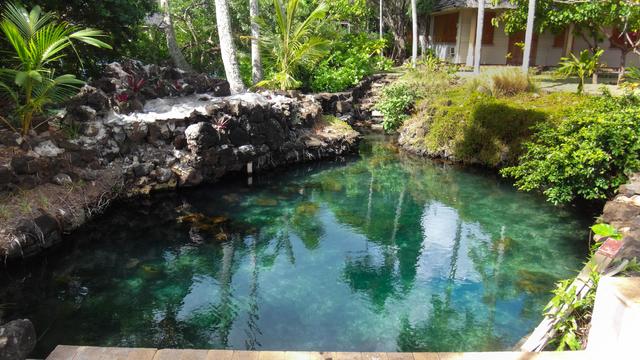UPDATE: On June 1, funding from a dedicated city land conservation fund which had been pending in the city’s proposed budget was restored to be used toward the purchase and permanent protection of Kanewai Spring. In a grand show of support for the project, more than 100 people from Hilo to Maui and the North Shore to Kuliouou submitted testimony on behalf of securing the funding to help protect the Spring.
“Mary Lindsay Kalikolani Correa testified that the preservation and care-taking of Kānewai was valuable for the connection to the community and the next generation as well as for the cultural and environmental health of the land and sea. Greg Stock, a teacher for the past 16 years in East Honolulu, regularly takes his students to Kānewai for service learning opportunities because it is an invaluable resource where young people can learn about Hawaiian culture, values, land management and much more,” (noted on Maunalua Fishpond Heritage Center Facebook page).
The Spring was listed as one of Hawaii’s Most Endangered Historic Places of 2015, an annual public awareness campaign jointly sponsored by Historic Hawaii Foundation, HONOLULU Magazine and the Hawaii State Historic Preservation Division.
Groups hope to save the Kanewai Spring
It was named one of Hawaii’s most endangered places last year and has been a trophy property owned by business scoundrels, but now a historic multimillion-dollar East Honolulu estate with a freshwater spring feeding a wildlife preserve is close to becoming a public resource through a community effort.
The Trust for Public Land and Maunalua Fishpond Heritage Center are trying to pull off a $2.65 million purchase of a nearly 70-year-old mansion that fronts a fishpond and has a pristine freshwater source, known as Kanewai Spring, in its backyard.
About half the money, $1.3 million, was approved for distribution April 8 by the state Board of Land and Natural Resources from the Legacy Land Conservation Program, while another $1 million from a dedicated city land conservation fund is pending in the city’s proposed budget.
The two organizations, which set up kanewaispring.org, are committed to raising the remaining $350,000 and recently received two $25,000 contributions. A purchase needs to be completed by Aug. 31.
Laura Kaakua, native lands project manager for the trust, said the two nonprofit organizations are asking for public donations to give back to a place that gives so much to the natural environment in an area where other springs and fishponds were destroyed for residential development.
“It’s so surprising and kind of amazing that this freshwater source still exists,” Kaakua said.
The two nonprofits say Kanewai, which means water of the Hawaiian god Kane, is the last major open freshwater spring flowing into the ocean in Honolulu, and the Historic Hawai‘i Foundation added the spring last year to its list of the state’s most endangered places.
Kanewai is believed to have once been a freshwater source for inhabitants of ancient cave shelters nearby, and the water supports the life cycle of many native animal species by flowing into Kanewai Fishpond, then into the Paiko Lagoon Wildlife Sanctuary and then into Maunalua Bay.
The spring is part of a residential estate at 5975 Kalanianaole Highway in Kuliouou that includes a 3,357-square-foot home built in 1948.
Both the spring and the home are largely out of public view. The home is tucked behind a high wall along the highway, while the fishpond is privately owned and ringed by several homes. Yet the property has a high-profile connection through one notorious prior owner who was convicted of running a local Ponzi scheme and another former owner who was found by a judge to have illicitly acquired the estate.
Bad actors
Ronald Rewald was the first ignoble owner.
Rewald used several well-regarded kamaaina names to form a fake investment firm, Bishop Baldwin Rewald Dillingham and Wong, in the late 1970s. He took in $22 million from more than 400 local investors and acquired a collection of businesses and properties, including the Kanewai mansion. The con man claimed he was working for the CIA, but was convicted of defrauding investors and sentenced to 80 years in prison in 1985. He was released in 1995 because of a back injury.
In 1985 the Kanewai estate was repossessed from Rewald in foreclosure and then bought by a new owner that year for $1.15 million.
The next ignoble owner was linked with a U.S. affiliate of a Japanese taxi company, Rikuo Kotsu Co. Ltd., which bought the property in 1989 for $1.8 million during Japan’s bubble economy that produced a landslide of Hawaii trophy real estate bought up by individuals and companies from Japan.
Rikuo’s founder and leader bought the home as part of several U.S. real estate investments using company money. A judge in California ruled that the executive, Whoe Joon Han, diverted about $38 million from Rikuo to his U.S. operations and then refused to disclose the assets when Rikuo ran into financial trouble in the late 1990s.
In 2006, after Han suffered health problems and was deemed mentally incompetent, Kwan Koo “Peter” Lee, son of Han’s mistress Nung Ja Hwang, took ownership of the Kanewai property in a transaction of no value, according to court and property records.
After a court ruling in which Lee and his mother were found to have diverted and liquidated Rikuo assets for their personal benefit, the Kanewai property was returned to Rikuo.
Vital habitat
Under Rikuo’s and Lee’s ownership, the property was left to deteriorate. That led Maunalua Fishpond Heritage Center to ask Rikuo about six years ago whether it could restore the spring, which is about 40 feet wide and covers roughly 1,000 square feet but had become choked with haole koa trees to the point of stagnation.
“The water was not flowing,” said Chris Cramer, the center’s founder and president, who said 200,000 gallons of water once flowed daily. “It was completely covered.”
Cramer’s organization received permission to clean up the spring, and for the last five years enlisted volunteers including school and community groups for the work on every third Saturday of the month.
“Now the water is sparkling,” Cramer said. “It’s pristine.”
There was, however, one unexpected downside to the restoration: Investors became attracted to the unique property. Cramer said some made offers and had ideas that included subdividing the property and converting the spring, which is lined with a dry-stacked stone wall and connects to the fishpond via a stone channel, into a swimming pool.
Such a plan would kill the freshwater supply to the fishpond, lagoon and ocean where it nurtures baby native fish species including opae, oopu, aholehole and pipiwai. The two nonprofits also said the spring helps support the Hawaiian stilt and black-crowned night heron birds as well as native limpets, shrimp and plants.
Continuing legacy
By preserving and owning the spring, Maunalua Fishpond Heritage Center will be able to maintain the historic feature and use it as an educational resource to teach people about the area’s spring and fishpond history that is mostly lost, while also teaching about Hawaii’s water cycle, native species and cultural practices.
Kaakua praised Rikuo for agreeing to sell the property for preservation instead of development.
“We were pleasantly surprised that they were willing to work with us,” she said. “They told us they felt it was the right thing to do.”
Kuliouou resident Edward L. “Butch” Correa Jr. said in a letter of support that the Kanewai preservation effort harks back to a campaign his mother, Naomi “Auntie Sister” Reeves Correa, was involved with to save Paiko Lagoon from being dredged for private boat mooring in the 1970s.
“The preservation of Kanewai Spring is essential to the restoration of Kanewai Pond, Paiko Lagoon and Maunalua Bay,” Correa wrote to the Legacy Land Conservation Program. “The work (Maunalua Fishpond Heritage) has done to restore Kanewai and the knowledge they have gathered and shared about the rich cultural heritage of Kuliouou and Maunalua is remarkable and they have much more to learn and share.”
Renovation plans
Hawaiian sailing canoe navigator and Niu Valley resident Nainoa Thompson also endorsed the purchase in a letter that said eight generations of his family have lived in the Niu and Kuliouou region.
“We have watched the change in our environment and community and are now looking at an amazing movement to honor, protect and restore our valuable places,” he wrote.
If successful with the acquisition, Maunalua Fishpond Heritage Center will own the property, which also includes a historic coconut grove of more than 50 trees, a one-tenth interest in the fishpond, a fishpond sluice gate and a fishing stone shrine where fishermen would make offerings to Hawaiian gods.
The organization envisions building an education center in place of the home, which is in bad condition, and said it would reuse as many of the historic elements and materials from the home as possible.
It would take an estimated $850,000 to build a new structure containing a classroom, community gathering space, caretaker’s residence and Maunalua Fishpond Heritage Center office, which could involve a separate two- or three-year fundraising campaign.



